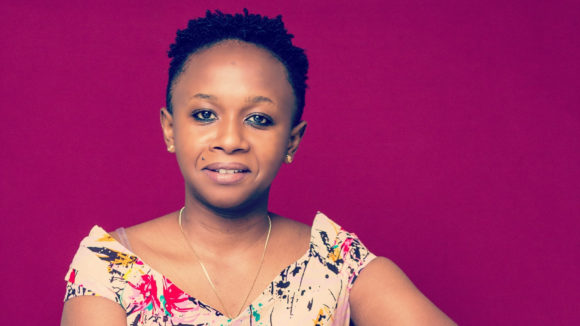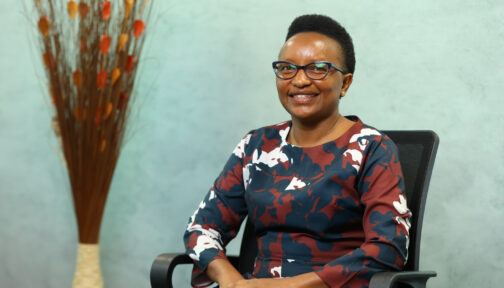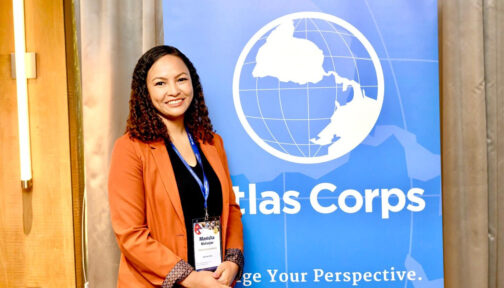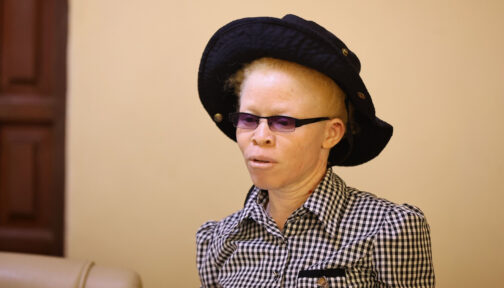Racheal Njiru is a disability inclusive project manager for Humanity & Inclusion at Kakuma refugee camp in Kenya, as part of Inclusive Futures initiative.
Racheal is leading the refugee component in of one of our UK aid-funded Inclusive Futures Disability Inclusive Development projects, which is helping over 3,000 micro-entrepreneurs with disabilities to grow, develop or sustain their businesses in Kenya. She was one of 53 Hilton Prize Scholars selected for the 2021 Hilton Humanitarian Prize Laureate Virtual Leadership Institute.
Here she explains what motivates her work on disability inclusion.
Racheal’s story
“I am very passionate about socio-economic development and am always happy when I am able to contribute to the promotion of human dignity.
“Disability inclusion was a new area where I was very interested to learn and incorporate the economic empowerment aspect. I have taken a personal interest ever since in promoting economic inclusion for people with disabilities. When I see the progress of a programme participant improve from one level to another, I am always motivated by this.
“I have diverse work experience working with pastoralists in the arid and semi-arid lands (ASALs) region of Kenya, with orphans and vulnerable children and I am now working in disability inclusion; all these are different communities with different vulnerabilities. In my current role, I ensure the voices and rights of people with disabilities are embedded in all our endeavours to ensure that a person with disability is independent.”
Building inclusive livelihoods
“Barriers to participation for people with disabilities in Kenya severely reduce livelihood opportunities. These barriers span discrimination against entrepreneurs with disabilities, reduced opportunities to access finance or secure tenders, restricted access to training or upskilling, and difficulties in running businesses without reasonable accommodation. Without independent access to funds or family support, many people with disabilities cannot compete favourably in the market.
“The InBusiness project under the Inclusive Futures programme provides business skills training for persons with disabilities. It aims to help over 2,000 micro-entrepreneurs with disabilities to grow, develop or sustain their businesses and will strengthen the overall system by advocating for a more inclusive business environment. Micro, small and medium-sized businesses provide livelihoods for millions of Kenyans and make up around 80% of all businesses in Kenya, accounting for about a third of the country’s annual economic output.
“InBusiness supports entrepreneurs to gain stable sources of income and live more fulfilling lives, through business training, providing assistive and mobility devices, promoting reasonable accommodation and accessibility, advocating for more inclusive procurement processes and linking entrepreneurs to market and procurement opportunities.
“A key part of Inclusive Futures involves generating research and evidence about what works and what doesn’t. It’s a continual learning process. For example, the project in its current phase builds on what we learned from previous projects, working with micro-entrepreneurs, including in a refugee context and supporting people with multiple disabilities like deafblindness, to scale up the InBusiness model. The evidence we produce is also crucial for engaging partners and government stakeholders. Inclusive Futures supports organisations to become more inclusive by conducting barrier assessments, developing action plans with these organisations, as well as providing disability inclusion training and expertise where organisations require it.
The roles of women in refugee and host communities
“As an African woman, I realise there are quite a number of variables that play around with perceptions about gender roles in Africa.
“For example, in Kakuma, close to the Ugandan border, the women in the host community and the refugee community face very different challenges. In the Kalukala community, women are responsible for building the house, for looking after the children, for making sure they have enough food to eat. The men look after the cows out in the bush. In the refugee camp, the women are provided with shelter, medicine, food – in some ways they are in a better position as they have some support. In other ways, they are worse off because many have faced trauma before arriving at Kakuma. There are also cultural challenges within Kakuma – different nationalities living together, with different traditions and beliefs. Greater interaction between the different groups promotes peace – in the community meetings we run, we target groups across the camp and host communities.”
A human rights-based approach to inclusion
“Most people view persons with disabilities with the charity model approach. There is a need to sensitise the larger community on the human rights-based approach, where everyone has equal access to services. By doing this I believe systems, structures and people will work cohesively on issues of stigma and discrimination. If this does not happen, then it will take a while to get there.
“One day, I hope we will not have to remind organisations, donors and the government to include persons with disabilities; but there will be intentional targeting, planning and budgeting across all programmes. I’d like to see the integration of refugees with disabilities benefiting from government systems (for example in Kenya), providing people within the camps with ID documents, and having them registered by the National Council for Persons With Disabilities so as a country we can improve our data on people with disabilities and help them to access the minimum benefits. I’d also like to see persons with disabilities empowered and independent; functionally and economically. Lastly, I would really be happy to see the OPD (organisations of people with disabilities) movement grow stronger in Turkana County in Kenya. I’m keen on identifying the complex scenarios that different populations face and be able to offer personalised support and interventions as opposed to generalised interventions.”




